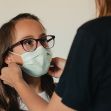With the new school year starting amid the COVID-19 pandemic, states are scrambling to decide the safest way to open schools, whether in person, virtually, or through a hybrid of in-person and virtual instruction. Parents are also struggling with the decision of whether to send their students back to school or keep them at home. While there is the COVID-19 risk to consider, there are other factors at play as well, like the services that students are missing out on by not being in school. Some students depend on the free or reduced meals that the school provides. In schools, students have physical education (P.E.) classes, which help them to get outside and get active. At home, children are more likely to stay inside and not be as active. With the pandemic, students are stuck at home in quarantine, not allowing them to continue developing their social skills in school with other children their age. The students most likely to be affected by this lack of services are low-income students. The vital role schools play in socialization is another factor that can’t be disregarded. Also, not least among parents’ concerns are their needs to return to work as the states reopen without leaving their children at home alone and unsupervised.
At least one state so far has seen its decision to reopen schools challenged in court. At the beginning of August, the Florida Education Association (FEA) and Governor Ron DeSantis met to schedule proceedings over the state’s order to reopen all schools for in-person instruction five days a week. The FEA moved to block this order, saying that it is “unconstitutional, confusing and subject to attack for due process.” The state responded that the motion against them is a “misguided effort to obtain a judicial mandate that forbids any school in the state from providing in-person instruction to any student.”
The FEA filed for a temporary injunction in Leon County against the order to reopen schools. In response, the state filed a motion to dismiss the lawsuit. Another similar case was consolidated into this case, as both cases shared common issues of law and fact. This latter case came out of Orange County, where some parties are also trying to overturn the reopening order, saying that it is unconstitutional. Both sides told the judge they need time to research and prepare for the case. In the meantime, Mark Richard, an FEA lawyer, suggested that the court mandate mediation, since time is of the essence, with some counties set to start school within about a week from the start of the proceedings.
In the Leon County circuit court, the judge denied the state’s motion to throw out the lawsuits challenging the mandate to reopen schools. Judge Charles Dodson, who presided over the case, is strongly urging the parties to seek mediation. He said, “This is a case that cries out for the parties to get together at this mediation and come up with an agreement. It’s a very complicated case. I know that. And between the governor and the education commissioner and the plaintiffs, I’m confident that if you all work really hard, you can do that, and I’m very hopeful that you can.” David Wells, an attorney who represents the state, wanted Dodson to dismiss the lawsuits because he said opening schools is a decision made by the executive branch (governor) and the state legislature, not the courts. In Florida, most parents are in favor of sending their children back to school, with an estimated 1.6 million of the state’s 2.8 million school-age children returning to in-person schooling for the new school year.
With what we know now regarding the COVID-19 risk among children, according to the CDC, children are more likely to experience milder COVID-19 symptoms and are less likely to die than adults. Still, the decision to return to school is fraught with logistical difficulties and valid concerns for the health and safety of the kids as well as the teachers, administrators and support staff involved.






